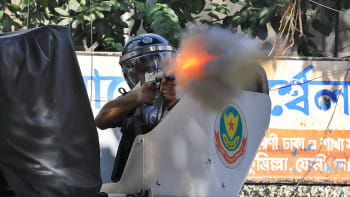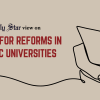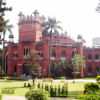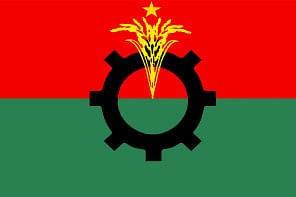New student politics demands respect, dignity, and trust

It is astounding how little a regime, one that has been in power for 15 consecutive years, understands the new form of student politics. Economic performance legitimacy may have satiated the post-liberation first generation who had lived through the depravities and atrocities of the Liberation War. However, the new generation aspires to more than just economic improvements, and rightfully so. Respect, dignity, and trust are the institutional cultures that speak more to the new student politics than metro rails, flyovers, or graduation to a middle-income country. And in each of these, the regime (and regimes past) repeatedly fails to deliver.
When students embarked on peaceful protests in July demanding quota reformation, it was the perceived disrespect felt after the prime minister's speech on July 14 ("If the grandchildren of the freedom fighters don't get quotas, then should the grandchildren of Razakars get quotas?") that gave the protest momentum. This show of disrespect is a tenet that seems to be repeating itself in the regime's politics. During the 2018 quota reform movement, a similar remark by the then minister of agriculture on April 9 (where she called the protesters "children of Razakars") fuelled students' anger.
Being blind to the anguish of systemic failure and corruption that led to the formation of these movements, while disrespectfully accursing the student protesters, is the first visible failure of the regime in understanding the new student politics. Perhaps this speaks more to the political culture that the people of party politics have cultivated in their ability to handle dissent. But it is this aggressive politics that instils a culture of disrespect and repeatedly rejects possibilities of peaceful, constructive negotiations. This institutional culture of indecency and disrespect is the least of the institutional failures the regime must acknowledge.
When I speak of new student politics, I am, of course, referring to the non-partisan student body—who have repeatedly taken to the streets in the past decade for their rights—not the militarised youth wings of the political bodies, whom the students associate with campus violence, rent-seeking, and corruption. It was the youth wing of the present regime, Bangladesh Chhatra League (BCL), that incited the next step of the quota protests, fuelled again by a remark, this time by the AL general secretary (insinuating that the BCL would give these protesters a "fitting reply").
Clashes between the quota protesters and the BCL ensued the very next day; BCL wearing clads of sanctioned impunity from the regime against "unsanctioned protesters." But when the students were able to drive the BCL back, by their sheer numbers, the regime called on its trusted law enforcement agencies—the police, the Rapid Action Battalion (Rab), and the Border Guard Bangladesh (BGB)—to quell the students. No conversation, only dominance.
On July 16, six students were killed, including Abu Sayed, and hundreds more since then. What started with tear gas and rubber bullets transformed into a bloody campaign using automatics and blind shooting from helicopters. When the curfew was imposed, the crackdowns followed.
But it was not just the physical violence and tragic losses that we find hard to process; it was also the stripping away of the dignity of the protesters, their right to protest, their right to dissent. It was a lack of morality, an attitude of authoritarian invincibility, poor politics, and impoverished accountability. Had the regime treated the students as people worthy of dignity, perhaps it would have given them their right to protest peacefully, to vent their grievances that the regime has itself created. It is the culture of viewing people with dignity that the regime needs to adopt in its politics.
I am unsure what exactly the regime was strategising during the days of total internet shutdown and curfew, but its propaganda campaign, led by some top functionaries, backfired gravely. Loss of public trust is possibly the strongest indicator of the decline of any regime.
From the prime minister not initially acknowledging the gravity of the human tragedy as she should have, the information minister claiming that the internet was not intentionally shut down but was disrupted due to the burning of data centres and hundreds of kilometres of cables (when previously acknowledging that the regime was forced to shut down the internet), the home minister stressing that police "remained patient and only fired when they were forced to" (when there are videos of police openly firing at unarmed individual protesters), to the Detective Branch chief claiming that student protest organisers were "detained for their own safety" (when credible sources attest that they were forcibly picked up, one even from a hospital mid-recovery)—the list goes on.
In the age of social media, repeating a lie does not make it the truth. Even the repeated narrative about BNP-Jamaat-led violence to justify law enforcement killings loses its weight (although, sadly, perhaps not for the staunchest of regime supporters) when so many killings of students and other civilians were caught on camera. Repeatedly, the regime keeps undermining the importance of trust-building with the new student politics. An institutional culture of "trust" is what is demanded by the new student politics.
Respect, dignity, and trust. Perhaps the regime does understand the new student politics. However, unless it can reform itself to provide these basic tenets to its citizenry—to the new student politics—the regime will be unable to cater to people's needs for rights and freedom, and remain on shaky grounds. As my colleagues have mentioned in another opinion piece, "Those who claim to govern must realise that their power is on lease." The regime must acknowledge that this lease cannot be extended through economic performance legitimacy alone. But foremost, what the regime needs to do is have the courage to publicly acknowledge, apologise, and ensure justice for the martyrs of the quota movement for the nation to move forward.
The collective memory of the draconian acts suffered in the pursuit of the right to protest, without proper justice and political reformation, may lead to repeated cycles of horrors. The people of Bangladesh also need to acknowledge that the burden of transforming society cannot be shouldered by students alone. It can only be carried through by the students, alongside the peasants, the workers, and the oppressed. Let injustice never prevail.
Adnan M S Fakir teaches economics at the University of Sussex, UK.
Views expressed in this article are the author's own.
Follow The Daily Star Opinion on Facebook for the latest opinions, commentaries and analyses by experts and professionals. To contribute your article or letter to The Daily Star Opinion, see our guidelines for submission.

 For all latest news, follow The Daily Star's Google News channel.
For all latest news, follow The Daily Star's Google News channel. 










Comments